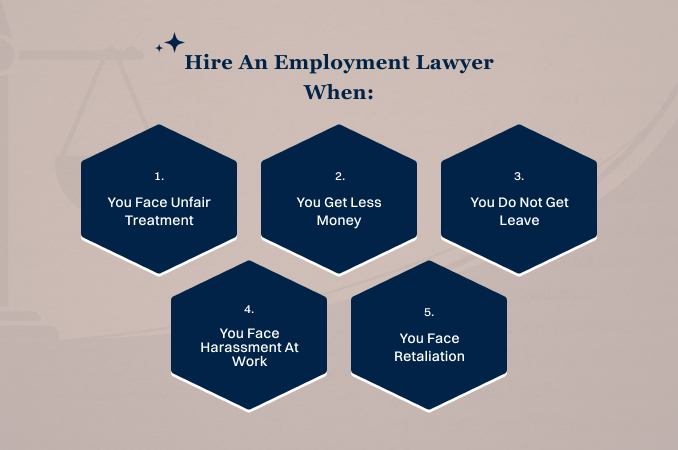
Table Of Contents
- Employment Laws In The United States
- Title VII of the Civil Rights Act of 1964
- Age Discrimination in Employment Act (ADEA)
- Americans with Disabilities Act (ADA)
- Fair Labour Standards Act (FLSA)
- Equal Pay Act of 1963
- Family and Medical Leave Act (FMLA)
- Occupational Safety and Health Act (OSHA)
- What is the Importance of Employment Laws?
- Can Employment Laws Change?
- Employment Laws Apply to Both Employees and Employers
- Employment Laws and Employment Are Different
- When Should You Hire an Employment Lawyer?
- Your Exclusive Rights as an Employee in the States
- Read Also:
Employment Laws: What are Your Rights as an Employee in the States?
Think about what would have happened if one day you went to your workplace only to find out that it has become a space of anarchy. That is the reason why you need employment laws.
Employment Laws are rules that are in place to protect people who work for a living—like you and me.
When I talk about these laws in the United States, I am talking about a set of protections that make sure employees are treated fairly, paid properly, and respected in the workplace.
If you’ve ever asked, “Can my boss do that?”—there’s probably a law that answers your question.
You see, understanding employment laws doesn’t mean you have to be a lawyer. In fact, knowing your rights is one of the most powerful tools you can have.
If someone treats you unfairly at work or violates your rights, you have the legal power to speak up and take action.
So, if you want to know about what employment laws are and about some of the most important ones among them, you have come to the right place. Therefore, keep reading…
Employment Laws In The United States

These laws may seem complex to us all. However, there are various federal and state laws looking after the multiple aspects of it.
Legislators create all of these to further a healthy employer-employee relationship. These are some of the top employment laws in the United States, as well as relevant case laws explaining their wide scope.
Title VII of the Civil Rights Act of 1964
As I have stated in most of my articles before, the Civil Rights Act is really an umbrella legislation. If you are a citizen of the United States, you probably understand how important this Act is.
It prohibits discrimination in all spheres of life. Amongst its provisions, employment discrimination gets a special mention. For all citizens of the US, this law prevents discrimination based on race, colour, religion, sex, and national origin.
In the Griggs v. Duke Power Co. (1971), we learn what “disparate impact” is. Under this theory, all forms of discrimination that affect protected groups are prohibited. Even if this was not done with the “intention to discriminate”.
Age Discrimination in Employment Act (ADEA)
This Act is another piece of legislation that acts as a safeguard for employees who have served the industry for years. It prohibits discrimination against employees who are 40 years of age or older.
In O’Connor v. Consolidated Coin Caterers Corp. (1996), we learn about the “mixed-motive” framework. This framework means that any employee filing for relief under this act can prove age discrimination claims as a motivating factor in cases of adverse employer behaviour.
Americans with Disabilities Act (ADA)
This Act protects individuals with physical and mental disabilities. It prohibits discrimination against them by ensuring a safe and supportive work environment. All employers have the duty to provide reasonable accommodations to their employees.
In the case of Toyota Motor Mfg., Kentucky, Inc. v. Williams (2002), the term “disability” was redefined under this Act.
According to the court ruling, an impairment should limit or restrict a person from major life activities. Otherwise, it is not eligible to qualify as a disability.
Fair Labour Standards Act (FLSA)
This Act is very important as it sets standards for minimum wage, overtime pay, and even sensitive social issues such as child labour.
Under this case law, Tennessee Coal, Iron & R.R. Co. v. Muscoda Local No. 123 of 944 the constitutionality of this Act was re-established. The FLSA’s regarding wage and hour are fair and valid, the court held.
Equal Pay Act of 1963
The next one on the list of employment laws that you need to know about is the Equal Pay Act of 1963. This law states that men and women must be paid equally if they perform the same job with the same level of responsibility.
Employers can’t pay someone less just because of their gender. It’s a simple idea, but still very important today.
Family and Medical Leave Act (FMLA)
The FMLA lets workers take up to 12 weeks of unpaid leave for big life events—like having a baby, taking care of a sick family member, or recovering from a serious health condition. No one can fire or punish you for needing time to care for yourself or your family.
Occupational Safety and Health Act (OSHA)
Finally, we have the OSHA. This law keeps workplaces safe and healthy. It requires employers to follow safety rules, train workers about hazards, and fix unsafe conditions.
If your job is dangerous, OSHA gives you the right to report it and demand changes, without being punished.
What is the Importance of Employment Laws?
There are quite a number of things that employment laws seek to address in both the public and private sectors.
These laws mainly apply to the processes of hiring and also termination of the contract by an employee.
Other than that, there are also other things like the working environment and the terms of employment as well.
In case you are wrongfully dismissed from your job for instance, you can seek interpretation from these laws.
Where possible, you might be compensated for wrongful dismissal. In case any harm occurs to you while at your place of work, these laws protect you as well.
In such a case, you might also be in line for compensation. The emergence of employment laws has helped save people from so many situations.
For instance, due to these laws, cases of wrongful dismissal are continuing to decrease with every passing day.
Can Employment Laws Change?
One of the things that people do not know about employment laws is that they change over time. Therefore, it is very important for you to take note of the fact that these laws change over time due to various circumstances.
As time went by, the laws also changed. As an employer and employee, it is very important for you to always be up to date on these changes.
Where you need to change things to conform to these laws, do so without fail. Failing to effect changes that might help you conform to the updated employment laws at any given time.
Employment Laws Apply to Both Employees and Employers
It is a common belief among many people that employment laws are there to protect employees alone. However, that is not the case!
Rather, these laws apply to all people irrespective of whether they are the employer or the employee.
Therefore, as an employee you need to know that you have a responsibility to make sure that you abide by the employment laws.
If you disobey these laws, you might also be in for some trouble. This is why it is very important for you to always show fidelity to these laws. The consequences of a violation might be dire.
Employment Laws and Employment Are Different
No matter where you come from, you might have heard about employment rights at some point. If you do not have adequate knowledge about them, then you might tend to imagine that they are similar to employment laws.
Well, even though many people think this is the case, that is not quite the truth. These two are very different.
Employment laws and employment rights are very much distinct. Employment rights basically mean the kind of rights you deserve at your place of work. They could be right to a proper meal at your place of work, right to fair treatment, and so on.
However, these rights vary a lot depending on the location. For instance, if you are in the US then the rights might vary from one place to the other. However, the laws are different, they speak to a relationship between an employee and an employer.
Some employees do not even know what their rights are for instance but know exactly what the law says.
This, therefore, means that it might be easier for you as an employer to deny your employees their rights without them knowing. However, that might not be the case with laws which people know so well.
When Should You Hire an Employment Lawyer?

Even with all these laws in place, sometimes they get broken. If your employer has violated your rights, hiring a qualified employment lawyer can make a huge difference. They know how these laws work, and they can help you fight back legally.
Here are some times when getting a lawyer is the best move:
- You were fired unfairly after complaining about discrimination, harassment, or unsafe conditions.
- You’re being paid less than your co-workers for the same job because of your gender, race, or another protected category.
- You’ve been denied family leave or punished for taking time off under FMLA.
- You were harassed at work and your employer did nothing to stop it.
- You were denied a reasonable accommodation for your disability.
- Your employer retaliated against you after you filed a complaint.
- You’ve been misclassified as a contractor or exempt worker, and denied overtime or benefits.
An employment lawyer can guide you through the process, gather evidence, and talk to your employer or their legal team on your behalf.
In many cases, just having a lawyer on your side can push the company to settle the issue fairly—without even going to court.
Your Exclusive Rights as an Employee in the States
In conclusion, Employment laws in the United States are here to protect you, not confuse you. Whether it’s fair pay, equal treatment, job safety, or time off, you have exclusive rights as a worker.
These laws help make sure that no matter your age, gender, race, religion, or disability, you are respected and supported at work.
Knowing your rights is the first step. Speaking up is the second. And if your employer doesn’t listen—the law is on your side. Don’t be afraid to ask questions, demand fair treatment, and get legal help if you need it.
Your job should be a place where you feel safe, valued, and empowered. Employment laws were made to make sure that’s exactly what it is.










All Comments
Alice Carroll
4th January, 2023
Thanks for also talking about how compensations are handed when it comes to working with an employer attorney. I will need one soon because I plan opening a coffeeshop business soon. Being able to hire workers easily will probably require a little bit of legal counsel. https://mohajerian.com/labor-employment/